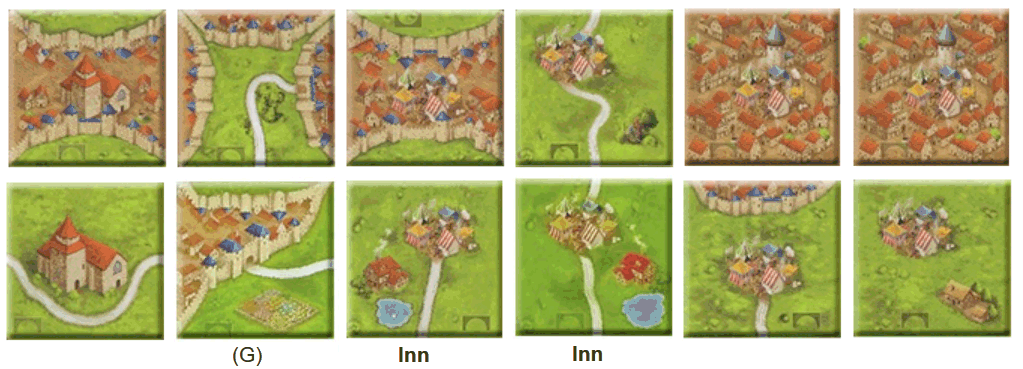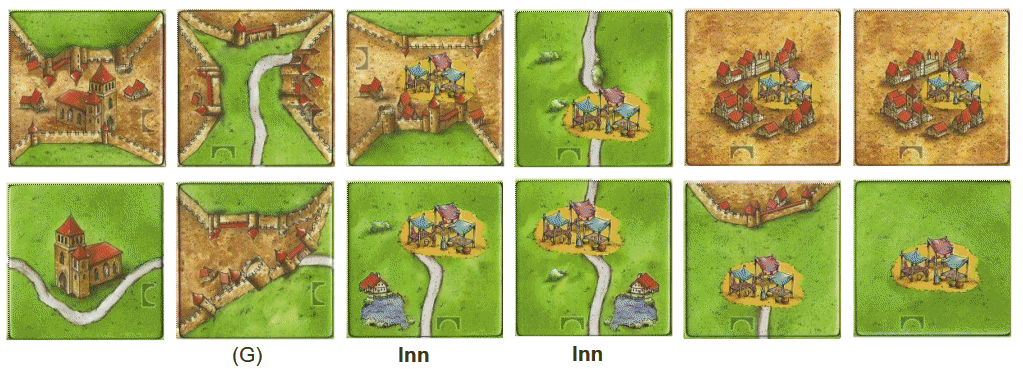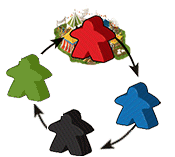|
Bazaar

We had to purchase an Italian version of this expansion, so the tiles
are slightly different.
The only real difference is the garden is missing on one of the tiles.


 The Bazaar expansion includes 12 additional land tiles, 8 of which display the Bazaar symbol. When you draw a tile with a bazaar symbol on it, do the steps: 1. Place a tile, 2. Place a meeple and 3. Score a feature normally. If the tile cannot be placed and is discarded, the bazaar will not occur.
The Bazaar expansion includes 12 additional land tiles, 8 of which display the Bazaar symbol. When you draw a tile with a bazaar symbol on it, do the steps: 1. Place a tile, 2. Place a meeple and 3. Score a feature normally. If the tile cannot be placed and is discarded, the bazaar will not occur.
After you have placed a bazaar and completed your turn, a bazaar auction
of landscape tiles takes place. Skip this step if there are fewer tiles
remaining than there are players.
Draw and reveal a number of tiles equal to the number of players. The
player on your left (the first auctioneer) then chooses one of those tiles
and bids a number of points for it (the bid can also be 0 points).
Continuing clockwise, players take turns bidding either a greater number
of points or passing, until all players have had the chance to bid or
pass. Then, the player who chose the tile must either:
- Buy the tile from the highest bidder, by
giving that player a number of points equal to the highest bid, OR
- Sell the tile to the highest bidder, by
taking from that player a number of points equal to the highest bid.
The score track is then adjusted so the buyer loses a number of points equal to the high bid, while the seller gains an equal number of points. The buyer then takes the tile that was being auctioned. If the only player to place a bid was the player who chose the tile, he or she pays a number of points equal to their bid, but no other player gains those points.
It is possible to bid more points than you have, and players can have a negative score as a result of buying tiles, especially at the beginning of the game.
Once a player has taken a tile during a bazaar auction, he or she is out of the round and cannot bid any more. Among the players who have not yet taken a tile this round, the next player clockwise from the previous auctioneer chooses (as the new auctioneer) which tile will be auctioned next, and a new auction begins. This continues until only one tile remains, and the player still without a tile takes it for free.
Now all players have one purchased tile. Starting in clockwise order
with the player on the left of the player who placed the bazaar tile,
all players play their purchased tile as in a normal turn with phases
1. Placing a tile, 2.
Placing a meeple (if he or she wishes), and 3.
Scoring a feature. Of course, nobody draws a tile in this "bazaar"
round.
NOTE: If one of the auctioned tiles was another Bazaar tile, it
does not generate another auction!
 4-player example:
Red,
Blue,
Black,
Green 4-player example:
Red,
Blue,
Black,
Green
- Red draw a bazaar tile and place it
normally. After his or her turn is complete,
Red draw 4 tiles for the auction.
- Blue, Black,
Green, Red:
Blue chooses one of the
tiles and bids 1 points. Black passes,
Green bids 2 points, and
Red bid 3 points. Because
Red is the highest bidder, and
Blue still wants the tile, he or she
buys it from Red for the bid price,
Blue loses 3 points while
Red gains 3 points.
- Black, Green,
Red:
Black chooses the next tile, and bids
2 points. Red passes and
Green bids 3 points, and
Black decides to sell
Green the tile.
Green loses 3 points and
Black gains 3 points.
- Red, Black:
Red choose one of the two
remaining tiles and bid 3 points. Black
decides to let you have the tile. Red
loses 3 points.
- Black: There is only one
tile left, which Black takes for free.
- Starting with Blue, each player places
his or her tile normally.
Bazaar with Builder expansion

Answer:
If you draw a bazaar tile and can perform your builder-turn, first take the appropriate number of face-down tiles and perform the bazaar and the auction. Then a new round with a special property starts - each player has an open and known tile instead of drawing an unknown tile, and you cannot place your abbey as your first tile. If you placed your auctioned tile and you can perform a builder-turn, you can choose to place your abbey or draw a new unknown tile. If any player draws a new bazaar tile [for his or her builder-turn or for message 4], it will be ignored until the last player who has an auctioned tile finishes his turn (including his builder-turn, if possible). Any pending delayed bazaars will take place now in turn. Once the bazaar rounds are finished, you perform your builder-turn.
In other words:
- Draw bazaar and perform first part of your double turn.
- Draw the tiles (still face-down)
- Turn tiles face-up and perform the auction
- ( Start ignoring any new bazaars )
- 1st Player with auctioned tile (if a bazaar tile, no bazaar is triggered)
- 1st player's builder-turn, if applicable (if a bazaar tile, no bazaar is triggered)
- Next player with auctioned tile (if a bazaar tile, no bazaar is triggered)
- Next player's builder-turn, if applicable (if a bazaar tile, no bazaar is triggered)
- ...
- Last player with auctioned tile (if a bazaar tile, no bazaar is triggered)
- Last player's builder-turn, if applicable (if a bazaar tile, no bazaar is triggered)
- ( Stop ignoring any new bazaars )
- Perform your builder-turn (second part of your double turn)
The player who created the Bazaar auction could have drawn a standard tile which when placed created their builder second turn and the second turn tile was the Bazaar tile. In this case the second turn has already been taken. But, if the first tile drawn was a Bazaar tile which when placed simultaneously created the Bazaar auction and the builder second turn at the same time, then I have to disagree with the order listed above.
Yes, the player must first draw the face-down Bazaar tiles. Then, if another tile exists, that tile should be used for the builder second turn while the Bazaar tiles are still face down.
It is important that the builder second turn tile does not reduce the available tile stack in such a way that the auction cannot be completed. But, in my opinion, it is just as important that any builder second turns that occur during the Bazaar do not eliminate the original player's builder second turn!
The new order of events should be:
- Draw bazaar and perform first part of your double turn.
- Draw the Bazaar tiles (still face-down)
- Perform your builder-turn (second part of your double turn)
- Turn Bazaar tiles face-up and perform the auction
- ( Start ignoring any new bazaars )
- 1st Player with auctioned tile (if a bazaar tile, no bazaar is triggered)
- 1st player's builder-turn, if applicable (if a bazaar tile, no bazaar is triggered)
- Next player with auctioned tile (if a bazaar tile, no bazaar is triggered)
- Next player's builder-turn, if applicable (if a bazaar tile, no bazaar is triggered)
- ...
- Last player with auctioned tile (if a bazaar tile, no bazaar is triggered)
- Last player's builder-turn, if applicable (if a bazaar tile, no bazaar is triggered)
- ( Stop ignoring any new bazaars )
Personal note: In both example, the "last player with auctioned tile" is always the player who originally drew the Bazaar tile which started the Bazaar. So, If that player's builder second turn is being delayed until after the Bazaar is completed, AND, they bid on and played another tile which created another builder second turn, at the end of the Bazaar they would actually be playing a "builder builder triple turn"! This is another reason that I am personally changing the rules!
|
|
|